|
 Sometimes, it seems that film music fans only enjoy pieces from a selected and limited number of composers, let's say typical and topical James Horner, John Williams, Hans Zimmer or Danny Elfman. Sometimes, it seems that film music fans only enjoy pieces from a selected and limited number of composers, let's say typical and topical James Horner, John Williams, Hans Zimmer or Danny Elfman.
But this is not always the case. Inside every good film music fan proud of being it, there's a real "Indiana Jones", always looking for hidden treasures. Some of them search through videogames, some others look for Asian music, but most of them like of collecting those minor, but of indisputable talent, composers.
This special interview is devoted to all of them.
Laura Karpman isn't a newcomer, although we have been recently paying attention to her. She'd be perfect to fit into that selected group of mass-worshipped composers, but her main target is not other but compose a good piece, putting all her talent into it, apart from the magnitude of the project she is working in.
We had a little talk with her, in order to confirm that Laura is an outstanding film composer.
BSOSpirit (BS): It is our understanding that your first professional assignment was a TV production called My Brother's Wife, starring the late John Ritter. How did you get involved in the said film?
Laura Karpman(LK): A very dear friend of mine was the producer and so it should have been easy…but it wasn’t. I had to do many, many demos and in fact tell a few stretches of the truth in order to get network approval.
BS: What memories do you treasure from this experience? Was that a different Laura, musically speaking, from the one that we can listen to nowadays?
LK: It took, probably ten times as long then, as it would take me now, to compose all of eighteen minutes of music! But it was a lovely score, stylistically classical (with a fugue) and I still enjoy it.
BS: If we are not wrong, in 1990 you were hired to score your first TV show: WIOU. What impact would you say it had on your working process having to meet the demanding deadlines so common in series?
LK: I collaborated on that show with Gary Chang, a wonderful composer. He fortunately had an espresso machine that we used with great frequency.
BS: Do you feel that these tight working schedules might somehow restrain a composer's creativity? How do you face these obstacles in order not to lose motivation to go on?
LK: Of course the more time one has, the more time one uses. Episodic television schedules are absolutely grueling, but I believe that a composer shows her stuff by how well she can compose under a great deal of pressure, not how well she can compose with few or no time restraints. I am deeply accustomed to working with all kinds of parameters, and have found ways to make those constraints creatively motivating.
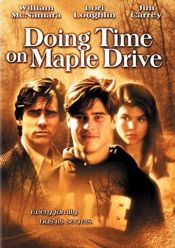 BS: For ten years after that, you worked in a large number of TV films. Most of them have not been aired in Spain but some have indeed. We've been able to see, e.g., Based on an Untrue Story, Abandoned and Deceived, Labor of Love, Love Lessons and The Princess & the Marine. Is there any particular one score of that period which we may not have had the opportunity to hear in Spain that you think is worth mentioning? BS: For ten years after that, you worked in a large number of TV films. Most of them have not been aired in Spain but some have indeed. We've been able to see, e.g., Based on an Untrue Story, Abandoned and Deceived, Labor of Love, Love Lessons and The Princess & the Marine. Is there any particular one score of that period which we may not have had the opportunity to hear in Spain that you think is worth mentioning?
LK: Doing Time on Maple Drive is a great favorite of mine – a wonderful movie and way ahead of its time. Another one that was really lovely, also directed by Ken Olin, was The Broken Cord, a movie about a Native American child who suffered from fetal alcohol syndrome. It is a very touching film.
BS: A definite highlight in your career was obviously the series The Living Edens. Can you tell us how come you were approached to score it?
LK: I had worked with the Executive Producer, Alex Gregory, on several other documentaries for PBS. Alex is brilliant, funny and a great collaborator. He approached me early on to score this series.
BS: Thanks to this series, you won no less than 4 Emmy awards. Did you ever have the feeling that your music was to be called for so many honors? LK: The great thing about The Living Edens was that there was no temp score ever. The pictures were well edited without score and I was asked to come up with a different sound for each “eden.” Alex and the supervising producer, Ann Kim, were amazing in terms of their love of music and their feeling that music could create drama. They would often move lines of narration to accommodate the score, and did not bury the music behind sound effects. We spotted these shows very carefully and made sure that there was aural space for narration, music, and sound effects. I think this is really why the scores turned out so well, and were so heavily Emmy-nominated and awarded.
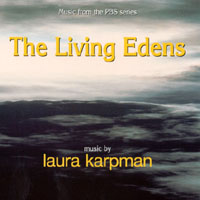 BS: In our condition as film music enthusiasts, we cannot miss the opportunity to ask you if there's a way to enjoy your outstanding score for this series. We know there's some cuts for download in your site but may we ever get to have a CD release? BS: In our condition as film music enthusiasts, we cannot miss the opportunity to ask you if there's a way to enjoy your outstanding score for this series. We know there's some cuts for download in your site but may we ever get to have a CD release?
LK: There’s been a CD released- you can get it from Amazon or CDBaby or my website (www.LauraKarpman.com)
BS: In you opinion, which one of the episodes features the best music of all?
LK: I love the music for Palau and Big Sur.
BS: You were also in charge of writing music for the pilot episode of Odyssey 5 as well as for some of the later chapters in the series. Do you think that this was a crucial show in terms of finally making your name known as a Sci-Fi music composer? Or is this rather a result of your work in Taken and the exposure it gives to have worked in a Steven Spielberg production?
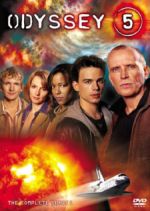 LK: Actually I scored all of Odyssey 5 (pilot and all episodes). Steven Spielberg heard the music for the pilot and that’s how I became the composer for Taken. Odyssey 5 was my first foray into the science fiction world. I love working in science fiction. It’s great to be able to use my musical imagination in really unusual ways. LK: Actually I scored all of Odyssey 5 (pilot and all episodes). Steven Spielberg heard the music for the pilot and that’s how I became the composer for Taken. Odyssey 5 was my first foray into the science fiction world. I love working in science fiction. It’s great to be able to use my musical imagination in really unusual ways.
BS: Given that we've just mentioned Taken, we were wondering how you came to be involved in the series. Your name had not been previously associated in any way with Steven Spielberg and it was quite a nice surprise for fans to learn about this.
LK: Todd Homme, who was the music executive at Dreamworks, brought my music to the attention of Spielberg and Les Boheme, the other executive producer. I did some demos based on Les’s scripts and they were well received and I got the job.
BS: What was the biggest challenge you had to face in relation to Taken?
 LK: Really the sheer volume of music that was required for 20 hours if programming was a great challenge. LK: Really the sheer volume of music that was required for 20 hours if programming was a great challenge.
BS: Which one is the episode you feel most proud of?
LK: I think probably the last episode, episode 10. I was the most tired, and it was probably the most emotional episode with the most music.
BS: You received a BMI Film Music Award for this last series. Did it feel different after the success of The Living Edens?
LK: It’s always great to be recognized for my work. BS: We would like to stop for a moment at the 2004 TV film Reversible Errors. It seems to have been quite an interesting project to work in given the cast it had: William H. Macy, Tom Selleck, Monica Potter and Felicity Huffman. The movie has not been aired in Spain but are there any anecdotes you would like to share with us?
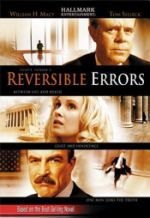 LK: I actually love the music for Reversible Errors. It is real neo-noir scoring and it helped inspire work on a non film music project of mine called Melting Pot, which is available to listen to on my website. LK: I actually love the music for Reversible Errors. It is real neo-noir scoring and it helped inspire work on a non film music project of mine called Melting Pot, which is available to listen to on my website.
BS: That same year you marked your official debut in the videogames arena. And what a debut! Everquest II was a huge success. What's the reason behind you moving from TV to videogames?
LK: Lea Vollack, who is in charge of music at Sony, heard my score for Taken and felt I would be a good choice for Everquest 2.
BS: What's the main issue that drew your attention to this project? 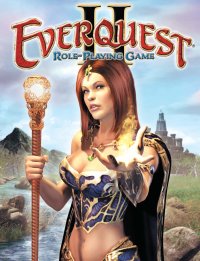 LK: I really think videogame music is the next great frontier for scoring. It offers a great freedom, really no boundaries, and I just love working in that genre. LK: I really think videogame music is the next great frontier for scoring. It offers a great freedom, really no boundaries, and I just love working in that genre.
BS: The only way to have access to a CD of your score was by buying the actual game. Why wasn't there a regular release?
LK: There unfortunately is not one, you have to buy the special edition of the game.
BS: This latter score is remarkably rich in textures and does further stand out because of its powerful themes and astonishing instrumentation. Would you classify it as one of your most elaborated scores to date?
LK: It certainly was, but Untold Legends is also a really interesting score. In both scores, I really tried to explore the orchestra.
BS: It seems to us that Everquest II may somehow have contributed to clearly defining the approach you would take for your next project: Untold Legends: Dark Kingdom. Has in some way Everquest II been a model upon which to base this next score of yours, in spite of the fact that Dark Kingdom does actually explore darker territories? LK: Indeed, Dark Kingdom is more relentless – it was really designed to be a war requiem, to explore the horrors and violence of battle.
BS: Dark Kingdom is a plain testimony of your impressive skills and talent as a film music composer. Is this the most ambitious project you've been involved in?
LK: In terms of sheer volume of music, Taken was the most ambitious, but Dark Kingdom used chorus. I used a middle Scottish text by Blind Hary, called The Wallace, which Braveheart was based upon. It was a very interesting challenge to set such an unusual text, and in an unfamiliar language. But the language is beautiful, strong, powerful, violent, and ultimately very moving. One of my favorite passages, which I set twice, is “in strowbill wer,” meaning, “in painful war.”
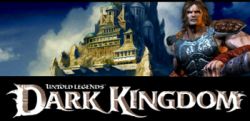 BS: Was it difficult to write for chorus for virtually every single cue in the score? Wasn't it very exhausting? BS: Was it difficult to write for chorus for virtually every single cue in the score? Wasn't it very exhausting?
LK: No, I love writing for the chorus. I had written a piece for the Juilliard Choral Union earlier in the year, so I had already been thinking a lot about composing for large chorus.
BS: Did you have any particular instructions as to what type of approach to follow, e.g., a Lord of the Rings type of score or were you rather on your own when deciding the musical style to apply?
LK: I was pretty much on my own. The game developers did request some swashbuckling battle music though.
BS: The degree of sophistication of videogames has made a quantum leap with the release of PS3. Dark Kingdom is one of those games that has profited from the said technological improvement over Everquest II. Has this influenced your way of scoring, too?
LK: Not yet. This game was recorded and mixed in 5.1 which we are very used to in film. Let’s see what the next game consoles yield.
BS: Are there any plans to release a soundtrack album to Dark Kingdom, as it has been the case with other epic videogames like Kameo or Primal? LK: Not yet – I hope we can release a CD.
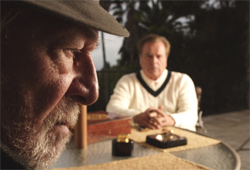 BS: Man in the Chair is the last film you've worked in. Veteran actor Christopher Plummer has a starring role in this very much anticipated film so we wonder if his performance may somehow have been a source of inspiration for your work? What's the score like? BS: Man in the Chair is the last film you've worked in. Veteran actor Christopher Plummer has a starring role in this very much anticipated film so we wonder if his performance may somehow have been a source of inspiration for your work? What's the score like?
LK: It’s a quirky small score, electronica with a dash of minimalism, Plummer is GREAT in the film, and it was a pleasure to underscore him.
BS: Currently you're are involved in a project that may once again give you a lot of exposure, namely, Masters of Science Fiction. This series comes after the great success of Masters of Horror but, this time; it's the writers that change between episodes, not directors. According to our information you'll be scoring three episodes, is that correct? Could you elaborate a little bit on this project? LK: I have scored 3 episodes, and both the directors and writers change for each episode. It’s a wonderful series that dramatizes and updates classic science fiction stories. I loved working on the series and I think the scores are quite unusual.
BS: Now turning to a different subject, we would like you to talk a little bit about your experience as creative consultant at Sundance 2006. What were exactly the tasks you were supposed to do? How come you took part in such initiative being a composer yourself?
LK: I was asked to come to Sundance as a advisor to the documentary film scoring program. I worked with composer fellows and film makers and tried to facilitate a productive dialogue between them. It was an inspiring time, particularly because I started my career as a fellow there. The Sundance Institute is a fabulous program for composers, directors and documentarians and creates a forum for them to hone their skills and collaborate.
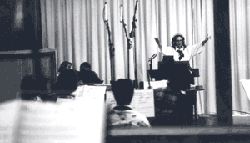 BS: You’ve also frequently participated in concerts. Which one was the first one ever? Are there any particular memories of that experience that you could share with us? BS: You’ve also frequently participated in concerts. Which one was the first one ever? Are there any particular memories of that experience that you could share with us?
LK: I have been composing and participating on concert music since I have been a child. It’s a great love of mine, and a wonderful way to keep ones compositional “chops” up.
BS: In addition to scoring for films, shows and videogames there’s also some music of yours for theatre or shall we rather speak about musicals? Here you’ve written pieces for renowned characters such as Lewis Carroll, Oscar Wilde or Shakespeare. What is it you do both the same and different here in comparison with any of the other media you’ve worked in?
LK: Theater is quite different than film and TV. Sometimes one is simply underscoring a scene, but the timings have to be flexible because it takes place in real time. Songs and musicals are another matter altogether, requiring actors/singers to make a song come alive through their interpretation.
BS: Let’s end up by devoting a few more minutes to talking about a certainly hot topic among composers. There’s a group of them who does virtually everything (i.e. composing, orchestrating and conducting the orchestra) vs. another one group that seems to focus more on composing mainly. You are part of this first group, so we wonder: why this choice?
LK: It’s impossible for me to divorce orchestration from composition. To me they seem the same. They serve each other. Because of the way I write, sketching out on pen and paper but realizing at the computer, this is a very natural way to work. Everybody has a different process. Everybody uses their skills and the technology differently. There is no one way to do anything. And I think whatever works, works. I love to conduct. I studied quite extensively and I think that it’s, for me, a very efficient way to record. I can move much more quickly in front of the orchestra than I can in the booth.
Thank you very much for doing a huge amount of research on my career, and for your carefully considered questions.
www.LauraKarpman.com
Interview by David Doncel
Transcription by Sergio Gorjon
|





